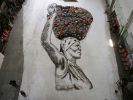Eye For Film >> Movies >> Waste Land (2010) Film Review
One man's muck, they say, is another man's brass - it's all just a matter of perspective. And it is the idea of shifting perspective - of the viewer, the documentarian and the documentary subjects - that is key to the success of Lucy Walker's film.
Her camera follows Brazillian artist Viktor Muniz, known for "giving life to garbage" through his artwork as he takes on his latest project - aiming to encourage the rubbish-pickers of Rio's Jardim Garmacho, the largest landfill dump in the world, to create art from the waste. "What I really want to be able to do," he tells us, "is change the lives of a group of people with material they use every day." It's a project with a social conscience, as he aims to give any profits from the project back to the pickers themselves. What he perhaps doesn't realise when he sets out, is that his own preconceptions will also be challenged.

Looking at Rio from a distance, it has a certain urban beauty, although as Muniz points out, you only see the ugliness of the favelas, with their drugs and social deprivation, when you get up close. The same is paradoxically true and untrue of Jardim Garmacho. On the one hand, once on the site of the dump itself, the smells are clearly a nasal assault - Walker captures the looks on the faces of Muniz and his colleagues, which tells you everything you need to know - while the level of the rubbish is staggering. However, once Muniz comes to talk to the trash pickers who work there a very different picture of the place emerges. This is first and foremost a community - and, surprisingly, a place that offers people more opportunity than you might imagine. Although Isis, who spends her days picking lighter materials such as plastic for recycling says she "feels disgusting" to be caught on camera, she along with many of the other women here talk about how the job of picking out the recycling is a much better option than the path to prostitution which many where she comes from take. This is not the last option for many, nor are they down-trodden by the task or lacking intellectual capability. One reads Machiavelli, another saves books for a library and there is social mobility at work here, with a union of the pickers aiming to build facilities for their community that will mean their children don't have to follow them into the same line of work.
It is not just perspective that counts, either, but the concept of transformation. Here, at this filthy site, people are trasnforming trash into cash at the same time as trying to transform the lives of those around them. It's a transformation that also lies at the heart of Muniz's art - as he takes still photographs of the trash-pickers at work, including more obviousy 'arty' shots that he feels have something to say about their situation and, with the help of the photos' subjects, recreates the images using material from the landfill site. These mosaic-style interpretations of each photograph are massive in terms of size and look much like a heap of rubbish from close up. Once you are elevated above them, however, the beauty of the image is revealed and he photographs these reproductions for auction.
Walker's documentary is moving, life-affirming and challenges what you think you might know about these people who pick through the rubbish. She isn't afraid of intimacy with her subjects but she also probes the idea of documentary as an art form itself, and the changes that merely putting a camera into a situation may bring about. And Walker doesn't shy away from showing that many of the people here are changed by their experience of making the film, although in some cases the changes are subtle and, again, not what we or Muniz might expect.
What is interesting, is that in many ways the people here are transformed not by being on camera per se, but by having a shift in their perspective facilitated by being on camera. They, too, are able perhaps, for a moment, to consider their lives as others - or at the very least Muniz - sees them. "We got here with difficulty but dignity," says one woman. It's true and Walker's film leaves you with the impression that "here" is still not their final destination.
Reviewed on: 19 Feb 2011


















